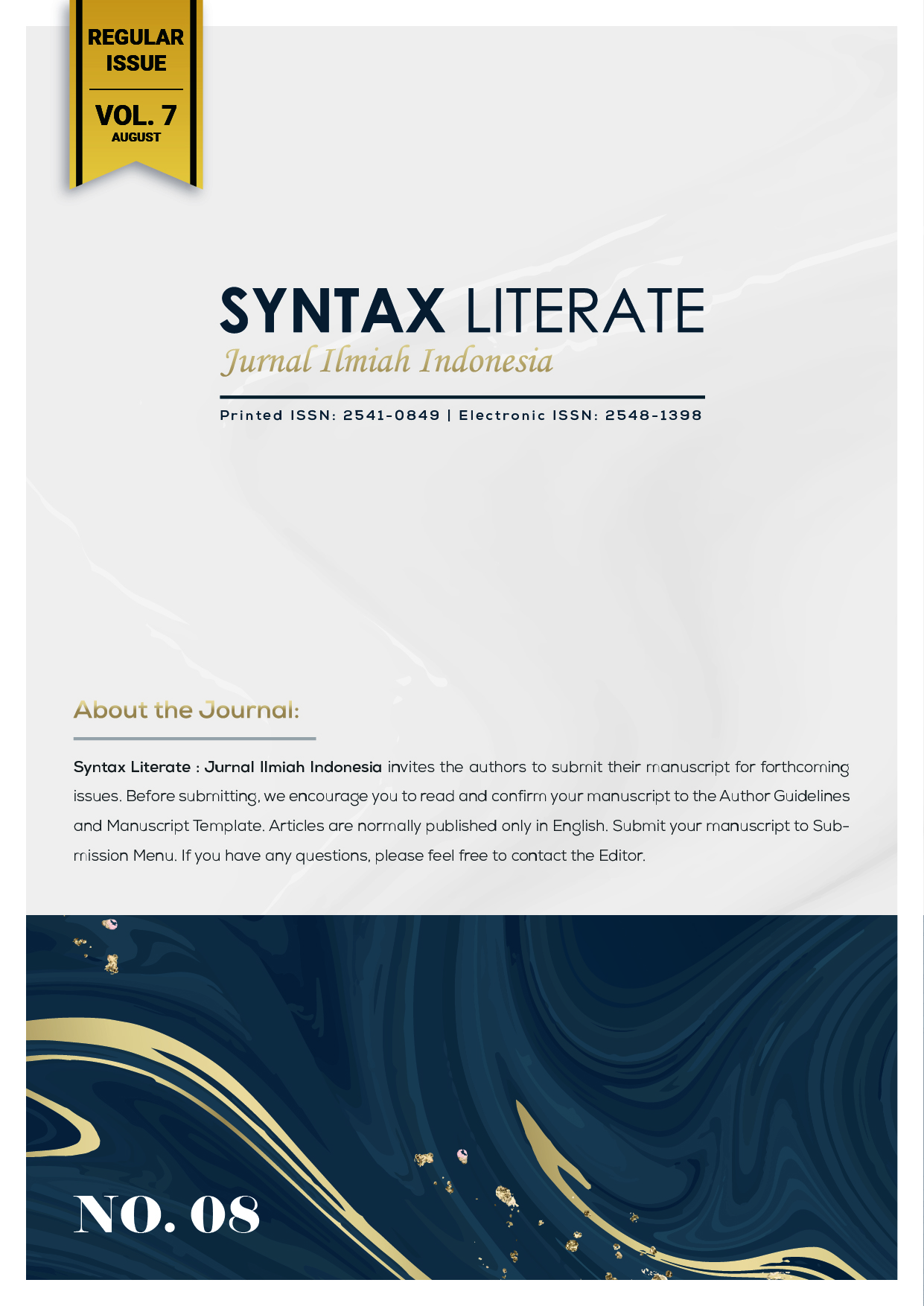Analysis Analysis of The Effect of Hot-Fit Models on Implementation of A Hospital Information System at Palangkaraya City Hospital
Abstract
This research is based on several problems faced by health workers in 2022 before SIRS is implemented and there are plans to implement SIRS in 2023. The aim of this research is to reveal empirically the influence of perceived benefits, quality of information, organizational support and work engagement on the implementation of SIRS. This research is included in quantitative research with a cross-sectional study design, the population used is 30 health workers, the sampling technique uses a saturated sample which makes the entire population as respondents. The analysis method uses the three box method and PLS-SEM with the help of the Smart-PLS program. The results of the analysis conclude that perceived benefits, quality of information and organizational support have a positive and significant effect both simultaneously and partially on the hospital information system, while work engagement has a negative effect on the implementation of the hospital information system.
Downloads
References
Akwaowo, C. D., Sabi, H. M., Ekpenyong, N., Isiguzo, C. M., Andem, N. F., Maduka, O., Dan, E., Umoh, E., Ekpin, V., & Uzoka, F. M. (2022). Adoption of electronic medical records in developing countries—A multi-state study of the Nigerian healthcare system. Frontiers in Digital Health, 4(November), 1–18. https://doi.org/10.3389/fdgth.2022.1017231
Ali, O., Murray, P. A., Muhammed, S., Dwivedi, Y. K., & Rashiti, S. (2022). Evaluating Organizational Level IT Innovation Adoption Factors among Global Firms. Journal of Innovation & Knowledge, 7(3). https://doi.org/10.1016/j.jik.2022.100213
Ali, O., Murray, P. A., Muhammed, S., Dwivedi, Y. K., & Rashiti, S. (2022). Evaluating Organizational Level IT Innovation Adoption Factors among Global Firms. Journal of Innovation & Knowledge, 7(3). https://doi.org/10.1016/j.jik.2022.100213
Awan, S. H., Habib, N., Akhtar, C. S., & Naveed, S. (2020). Effectiveness of Performance Management System for Employee Performance Through Engagement. SAGE Open, 10(4), 2158244020969383. https://doi.org/10.1177/2158244020969383
Bagayoko, C. O., Tchuente, J., Traoré, D., Moukoumbi Lipenguet, G., Ondzigue Mbenga, R., Koumamba, A. P., Ondjani, M. C., Ndjeli, O. L., & Gagnon, M.-P. (2020). Implementation of a national electronic health information system in Gabon: a survey of healthcare providers’ perceptions. BMC Medical Informatics and Decision Making, 20(1), 202. https://doi.org/10.1186/s12911-020-01213-y
Bakker, A. B., & Leiter, M. P. (2015). Work Engagement: A Handbook of Essential Theory and Research. Taylor \& Francis Group.
Bolodeoku, P. B., Igbinoba, E., Salau, P. O., Chukwudi, C. K., & Idia, S. E. (2022). Perceived usefulness of technology and multiple salient outcomes: the improbable case of oil and gas workers. Heliyon, 8(4), e09322. https://doi.org/https://doi.org/10.1016/j.heliyon.2022.e09322
Bolodeoku, P. B., Igbinoba, E., Salau, P. O., Chukwudi, C. K., & Idia, S. E. (2022). Perceived usefulness of technology and multiple salient outcomes: the improbable case of oil and gas workers. Heliyon, 8(4), e09322. https://doi.org/https://doi.org/10.1016/j.heliyon.2022.e09322
Dash, S., Shakyawar, S. K., Sharma, M., & Kaushik, S. (2019). Big data in healthcare: management, analysis and future prospects. Journal of Big Data, 6(1), 54. https://doi.org/10.1186/s40537-019-0217-0
Davis, F. D., Granić, A., & Marangunić, N. (2024). The Technology Acceptance Model: 30 Years of TAM. Springer International Publishing. https://books.google.co.id/books?id=rhhrzQEACAAJ
Delone, W. H., & McLean, E. R. (2016). Information Systems Success Measurement. Now Publishers. https://books.google.co.id/books?id=IowEDQEACAAJ
Edwards, G. (1980). Implementing Public Policy. Congressional Quarterly Press.
Eisenberger, R., & Stinglhamber, F. (2011). Perceived Organizational Support: Fostering Enthusiastic and Productive Employees. American Psychological Association. https://books.google.co.id/books?id=aCahcQAACAAJ
Feldman, S. S., Buchalter, S., & Hayes, L. W. (2018). Health Information Technology in Healthcare Quality and Patient Safety: Literature Review. JMIR Medical Informatics, 6(2), e10264. https://doi.org/10.2196/10264
Huang, R.-T. (2022). Exploring the roles of self-determined motivation and perceived organizational support in organizational change. European Journal of Management and Business Economics, ahead-of-p(ahead-of-print). https://doi.org/10.1108/EJMBE-03-2022-0056
Jiang, G., Liu, F., Liu, W., Liu, S., Chen, Y., & Xu, D. (2021). Effects of information quality on information adoption on social media review platforms: moderating role of perceived risk. Data Science and Management, 1(1), 13–22. https://doi.org/https://doi.org/10.1016/j.dsm.2021.02.004
Ljubicic, V., Ketikidis, P. H., & Lazuras, L. (2020). Drivers of intentions to use healthcare information systems among health and care professionals. Health Informatics Journal, 26(1), 56–71. https://doi.org/10.1177/1460458218813629
Maamari, B. E., & Osta, A. (2021). The effect of HRIS implementation success on job involvement, job satisfaction and work engagement in SMEs. International Journal of Organizational Analysis, 29(5), 1269–1286. https://doi.org/10.1108/IJOA-07-2020-2298
Masri, N. W., You, J.-J., Ruangkanjanases, A., Chen, S.-C., & Pan, C.-I. (2020). Assessing the Effects of Information System Quality and Relationship Quality on Continuance Intention in E-Tourism. International Journal of Environmental Research and Public Health, 17(1). https://doi.org/10.3390/ijerph17010174
Mazzetti, G., Robledo, E., Vignoli, M., Topa, G., Guglielmi, D., & Schaufeli, W. B. (2023). Work Engagement: A meta-Analysis Using the Job Demands-Resources Model. Psychological Reports, 126(3), 1069–1107. https://doi.org/10.1177/00332941211051988
Neuber, L., Englitz, C., Schulte, N., Boris Forthmann, & Holling, H. (2022). How work engagement relates to performance and absenteeism: a meta-analysis. European Journal of Work and Organizational Psychology, 31(2), 292–315. https://doi.org/10.1080/1359432X.2021.1953989
Sameer, S. K. (2022). The Interplay of digitalization, organizational support, workforce agility and task performance in a blended working environment: evidence from Indian public sector organizations. In Asian Business & Management (pp. 1–21). https://doi.org/10.1057/s41291-022-00205-2
Sittig, D. F., Wright, A., Coiera, E., Magrabi, F., Ratwani, R., Bates, D. W., & Singh, H. (2020). Current challenges in health information technology–related patient safety. Health Informatics Journal, 26(1), 181–189. https://doi.org/10.1177/1460458218814893
Stawowy, M., Duer, S., Perlicki, K., Mrozek, T., & HarniÄárová, M. (2023). Supporting Information Quality Management in Information and Communications Technology Systems with Uncertainty Modelling. Energies, 16(6). https://doi.org/10.3390/en16062531
Upadhyay, S., & Hu, H. (2022). A Qualitative Analysis of the Impact of Electronic Health Records (EHR) on Healthcare Quality and Safety: Clinicians’ Lived Experiences. Health Services Insights, 15, 11786329211070722. https://doi.org/10.1177/11786329211070722
Copyright (c) 2023 Sri Astuti, Fransiskus Adikara, Rian Adi Pamungkas

This work is licensed under a Creative Commons Attribution-ShareAlike 4.0 International License.











